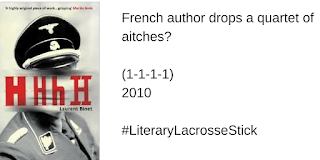Stylistically the book is quite daring as well, with visuals, two different sized alphabets (our 26 letter and DNA's 4 letter alphabet), as the book drills down beneath the level of word to that of the letters themselves).
Synopsis:
Three very powerful female characters, Mother, Crone and genetic Creatrix. None of them will meekly submit to their besiegers. Their three narrative voices, intercut and interweave with one another. In a sense, all three are palimpsests, constantly writing over, and being written by, one of the other two. Whether they are aware or not, they are being informed by another intimate voice so close at hand, as to be under the skin.
In post Peace Agreement Northern Ireland, a young mother feels besieged. Both by the demands of motherhood and her militant Loyalist husband, decommissioned with the advent of Peace and thrown back into the world of the domestic hearth; whither the violence of his soul? To stop her mind becoming silted up through inactivity, surrounded by the infantile and the exasperating, she maintains a journal. Through which she pursues questions of nature versus nurture in the development of her children, within a divided society such as Northern Ireland, proffering its rarefied environment of acquired symbol and historical legacy. Only, why is her journal all out of sequence and what meaning can it therefore provide to answer her despairing question, 'why do we even have children?'
In Florida, a British septuagenarian with no papers and no official existence, also finds herself under a state of siege. Her community is currently surrounded by FBI, ATF and DEA armed agents. Yet they are not a sect of any kind, rather a refuge for battered women. And while it is true she does have a scheme for redrawing the map of the world, it could hardly be said to be a doomsday scenario. Except maybe, if you're a male of the species. Her fight is for hearts and minds, which might explain why her principal manifestation appears to be through the internet. Where lurk useful allies for her in the war of information technology.
In commercial laboratories all over the world, the human genome is being decoded and compiled. Or ravished and dissected depending on your point of view. What is that textual voice feedbacking through the monitors? Protesting the assault; challenging the epistemologies of both scientist and theologian; chiding us for our linear notions of relationship, the depleted metaphors with which we construct thought and even our 26 letter alphabet in the face of the genome's intricate weaves formed from combinations of just 4 letters. Goading us that we will never unravel the mystery that lies behind the genetic code, unless we open up our very natures to unlimited potential.
Here is a small extract from the Northern Irish mother as she realises her daughter has reached an important developmental stage
You can pre-order "Three Dreams In The Key Of G" direct from the publisher here
paperback £10.00
hardback £20.00
PDF for e-readers £7.00
For incentive prizes for purchase, see here; the chance to win all 5 of my flash fiction collections, a unique personalised flash fiction story I will write for you, a limited edition sculpture or my latest beautifully designed (not by me) chapbook with 24 stories.














































